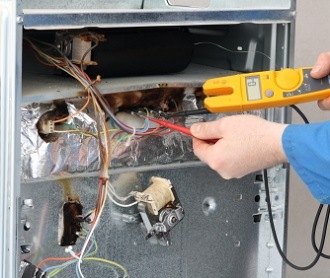Practicing Electrical Safety Before, During, & After Storms
 When a storm or natural disaster hits, we typically think of the damage wind and rain will do-- flooding, downed trees, missing shingles, and much more. There are also a myriad of electrical problems that can be caused by storms, with effects that last long after the storm passes. Thankfully, your professional electricians at Twinson Electric have a few tips on staying safe before, during, and after a storm and making sure your electrical systems are intact.
When a storm or natural disaster hits, we typically think of the damage wind and rain will do-- flooding, downed trees, missing shingles, and much more. There are also a myriad of electrical problems that can be caused by storms, with effects that last long after the storm passes. Thankfully, your professional electricians at Twinson Electric have a few tips on staying safe before, during, and after a storm and making sure your electrical systems are intact.
Preparing Before The Storm Hits
When you know a storm is on the way, it's important to get your electrical system ready. Make sure you've got essentials like batteries, water, and radios. If your home's electricity cuts out, you'll need portable power sources like flashlights or battery-powered charging units. It's also important to make sure you've got the phone number of your electrician so you can start getting repairs as soon as the storm passes.
If you can, unplug all of your electrical devices before a storm hits. Electrical surges from lighting can damage your belongings as well as pose physical injury risks. This will also protect circuits from overloading and damaging your electrical system when power returns. It could also help to make sure your surge protection device is up to date so that if surges do happen, your home will be safe.
The Effects Of Lightning During A Storm
Lightning is a burst of electricity that almost always occurs during a thunderstorm, and if you're not careful around lightning, disaster could strike as dangerously as lightning would. There are a couple of rules to follow when it comes to lightning safety during a storm:
- It's possible for lightning from a storm to travel, so seek proper shelter when you hear thunder crashing.
- If you're inside during the storm, be sure to stay away from doors and windows. If lightning strikes nearby, there's a risk of injury.
- Only speak on cordless phones during a lightning storm-- if there's an electrical surge, you could get electrocuted.
Power Lines After A Storm
When strong gusts of wind blow, power lines can be toppled over and damaged. If a power line falls near your home, it's vital to stay at least ten feet away from the line once the storm passes. Since the human body is a conductor, there's a possibility if you get too close, you could get electrocuted if the line is still live.
If you come across a downed power line while driving, don't drive over it. While being inside your car is safe, you don't want to take any risks. Warn others about the downed line and contact emergency services to get the line removed.
If you get too close to a power line unknowingly, it's important to shuffle away from it in small movements, making sure your feet stay on the ground. This will eliminate any potential for being shocked.
When a power line has come into contact with water, like a puddle or a pool, be cautious. Water is a conductor of electricity, meaning anything that touches the water could become energized.




